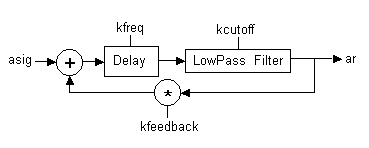wguide1
wguide1 — A simple waveguide model consisting of one delay-line and one first-order lowpass filter.
Description
A simple waveguide model consisting of one delay-line and one first-order lowpass filter.
Performance
asig -- the input of excitation noise.
xfreq -- the frequency (i.e. the inverse of delay time) Changed to x-rate in Csound version 3.59.
kcutoff -- the filter cutoff frequency in Hz.
kfeedback -- the feedback factor.
wguide1 is the most elemental waveguide model, consisting of one delay-line and one first-order lowpass filter.
Implementing waveguide algorithms as opcodes, instead of orc instruments, allows the user to set kr different than sr, allowing better performance particulary when using real-time.

wguide1.
Examples
Here is an example of the wguide1 opcode. It uses the file wguide1.csd.
Example 1050. Example of the wguide1 opcode.
See the sections Real-time Audio and Command Line Flags for more information on using command line flags.
<CsoundSynthesizer> <CsOptions> ; Select audio/midi flags here according to platform ; Audio out Audio in No messages -odac -iadc -d ;;;RT audio I/O ; For Non-realtime ouput leave only the line below: ; -o wguide1.wav -W ;;; for file output any platform </CsOptions> <CsInstruments> ; Initialize the global variables. sr = 44100 kr = 4410 ksmps = 10 nchnls = 1 ; Instrument #1 - a simple noise waveform. instr 1 ; Generate some noise. asig noise 20000, 0.5 out asig endin ; Instrument #2 - a waveguide example. instr 2 ; Generate some noise. asig noise 20000, 0.5 ; Run it through a wave-guide model. kfreq init 200 kcutoff init 3000 kfeedback init 0.8 awg1 wguide1 asig, kfreq, kcutoff, kfeedback out awg1 endin </CsInstruments> <CsScore> ; Play Instrument #1 for 2 seconds. i 1 0 2 ; Play Instrument #2 for 2 seconds. i 2 2 2 e </CsScore> </CsoundSynthesizer>